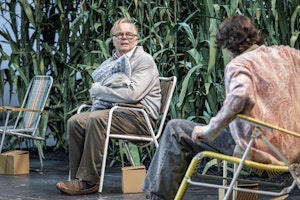This article is taken from the April 2025 issue of The Critic. To get the full magazine why not subscribe? Right now we’re offering five issues for just £10.
A large dollop of irony comes with the sky-high ticket price for The Seagull at the Barbican. Chekhov’s masterpiece tragicomedy is re-tooled here by a star left wing German director (Thomas Ostermeier), with a screen-and-stage doyenne, Cate Blanchett, and luminous supporting cast.
Back in 1896 when it was first performed in St Petersburg, the clash of generations bound by duty and fate, while struggling to comprehend or even like each other, enthralled wealthy Russian theatregoers (eventually, after its disastrous opening night). Some things don’t change.
Blanchett comes to London as part of a busy pipeline of cinema A-listers haunting the stage: in this modern dress production adapted by Ostermeier and Duncan Macmillan, she vamps it up with gusto as Irina Arkadina, the self-obsessed actress on an enforced summer holiday at her brother’s estate, and overshadows and depletes her sickly nepo-babe son Konstantin Treplev (Kodi Smit-McPhee).
A permanently restless mutton-dressed-as-lamb fashion victim, Irina arrives in purple jumpsuit and biker jacket with all the restive compulsion of an exhibitionist. The updating of language is cheeky and often very funny: “Poor little crumpet,” she clucks absently to her offspring, after she has crushed his theatrical hopes from the first scene.
This version is stripped of its Russianness. We might as well be in Brooklyn
Smit-McPhee is a good fit for Konstantin — a wan Australian version of Timothée Chalamet, with a Gen-Z nasal whine and a mix of vulnerability and arm-waving disdain for anyone over 40.
Ostermeier relishes taking liberties with classic texts, and a lot of his signature traits are on display here. Some of the characters deliver their main speeches in front of a standing microphone, signalling awareness of an audience. There’s standard German theatrical left-wingery — the representative of the downtrodden in the Tsarist system opens the evening with a rendition of Billy Bragg’s “Milkman of Human Kindness” adding, “You weren’t expecting that, were you?”
To which the honest answer is: hey, it’s radical theatre from the 2000s, so we are basically expecting lots of telling off of the audience for being there from people standing at microphones.
These diversions make a longish play longer. But once we have indulged the adaptors’ puckish tendencies, this cast gets into its groove, and Blanchett delivers her lines and ad libs with gusto: “You could have heard a pin drop,” she says in that resonant contralto: “And it was press night.”
Strains of The Stranglers’ “Golden Brown” drift across the lake, evoking the sticky haze and unease. The set by Magda Willi reflects her strong style in opera design: a single expressionist clump of reeds from and into which the characters emerge and retreat, against the backdrop of a featureless sky changing colour across the day.
The symbolic seagull arrives as a theatrical prop, stiff and painted with a bloody gash and will end up in a glass case as another relic of spontaneity destroyed. Summer sedation at the cash-strapped estate is thrown into a loop by the affair of the 19-year-old ingenue neighbour Nina (Emma Corrin) and Trigorin (Tom Burke), a cynical writer and Irina’s indifferent lover.
Corrin is a fine actress (a sensitive Diana in Netflix’s The Crown). Here, she’s short-haired and streetwise in bovver boots and revealing waistcoat. “Nice … top,” says Irina tartly as she drifts by.
Alas the sensual frisson and exploitative aspect that makes Nina’s relationship with a much older Trigorin so destructive feel like a low-energy lightbulb.
However, we get some fantastic performances from the supporting cast, especially Masha (Tanya Reynolds). A snuff addict in the original, she is an insistent vaper here, leaning into melancholic cynicism in her tracksuit bottoms.
When she caves in to marry Medvedenko (Zachary Hart), her descent into alcoholism is enthralling. Chekhov has a knack of making you want to get onto the stage and stop fictitious characters doing awful things to each other.

Jason Watkins is a delight as Sorin, the doddering, pathetic but endearing uncle who will never escape the estate or his own fury at a career spent in the meaningless wastes of Russian bureaucracy or his sister’s autocratic demands.
Overall though, this version is stripped of its Russianness. We might as well be in Brooklyn as in Sorin’s ramshackle country estate, with one mention of Volodymyr Zelensky shoehorned into a panoply of left-wing heroes.
Ostermeier has said he wanted to avoid “worship” of a great work and the intent is to make it about all of us, not about the nineteenth-century cast of “them”, and a reflection of the demand from Konstantin in Chekhov’s original: “We need new forms, and if we can’t have them, we had better have nothing.” To which this twenty-first-century critic might say, yay: but not maybe so many, all at once, in one production.
This overkill is offset by the performances and of course, by Irina, with Blanchett’s loquacious intensity, chattering on while her son disappears into the reeds — and a gunshot rings out.







